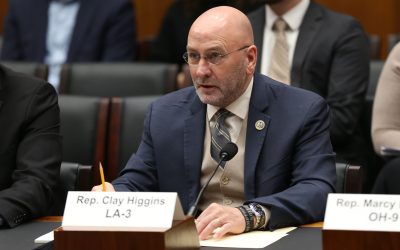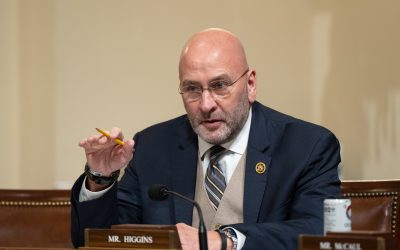Democrats in Congress and progressive advocates are coalescing around a strategy to try to pass immigration bills piecemeal, as the Biden administration looks for ways to enact a pathway to citizenship for millions of immigrants without a permanent legal status.
As President Biden’s comprehensive immigration bill—which he outlined on his first day in office—is set to formally be introduced in Congress on Thursday, Democrats are pursuing several tracks at once, aiming to see if the comprehensive bill gains any traction while simultaneously pushing other bills to offer legal pathways to narrower immigrant populations.
“If there are moving vehicles where parts of this can happen, I think all of us would certainly say we want to…attach significant elements to a moving vehicle,” Sen. Bob Menendez (D., N.J.) said in a call with reporters Thursday.
White House officials have used similar language with immigration advocates, saying they were embracing the approach of “multiple trains leaving the station,” according to two people familiar with their thinking.
Mr. Menendez said he has already spoken to Republicans who might not be on board with the entire proposal but have said they are interested in various elements.
So far, the Biden administration has overturned some of former President Donald Trump‘s most high-profile policies and proposed an immigration bill, while leaving some Trump policies in place for now and prioritizing a Covid-19 aid package ahead of other legislation.
Mr. Biden’s comprehensive proposal would create a legalization pathway for the approximately 11 million people who entered the country illegally, overstayed visas or have obtained temporary protection from deportation.
It would have an expedited pathway for farm workers and the young immigrants known as Dreamers, along with changes to the legal immigration, refugee and asylum systems. It proposes adding more technology to monitor people and drugs at the border, but unlike previous compromise bills, Mr. Biden’s proposal lacks the countermeasures of increased security or deterrence at the border that Republicans have asked for in exchange for legalization.
The comprehensive plan drew swift condemnation from Republicans as a Democratic wish list of proposals rather than a stab at a bipartisan overhaul. Efforts by the past three presidents to pass comprehensive legislation have been stymied in Congress.
Rep. Clay Higgins (R., La.), ranking member of a House border-security subcommittee, said the Biden administration had made it less attractive to work with Democrats on immigration by issuing numerous executive orders undoing many of Mr. Trump’s border and immigration policies.
“Respectfully, to our president and his base, this is liberal red meat,” he said, adding: “I believe there’s room in the middle to find bipartisan agreement, but we’re not going to give up our core principles to get it.”
In a CNN town hall earlier this week, Mr. Biden said he would also be open to a piecemeal approach on immigration, including a narrow bill that addresses increasing the refugee cap.
“There’s things that I would deal [with] by itself, but not at the expense of saying, ‘I’m never going to do the other,’ ” Mr. Biden said. “There is a reasonable path to citizenship.”
Top aides to Mr. Biden have been in regular communication with the Congressional Hispanic Caucus to figure out a path forward on immigration, with Jeff Zients, Mr. Biden’s coronavirus coordinator, meeting with members on Wednesday, according to people familiar with the discussions.
Facing an April 1 deadline to bypass the committee process for bills passed in the last Congress, Democrats are looking at two bills they hope could win Republican support in the Senate, where most legislation requires 60 votes to pass. One would create a citizenship path for the young immigrants, known as Dreamers, who came to the U.S. as children and have lived in the country illegally. A similar bill has already been introduced by Sens. Dick Durbin (D., Ill.) and Lindsey Graham (R., S.C.) in the Senate. A second, passed by the House last year with more than 30 Republican votes, would offer citizenship to about a million farm workers in the U.S. without legal authorization.
Congressional aides and other advocates believe those bills could attract several GOP votes in the Senate, though likely not the 10 needed to enact either without significant concessions from Democrats on border security and other immigration matters.
Alex Conant, a Republican consultant who previously worked for Sen. Marco Rubio (R., Fla.), one of the gang of eight senators who hammered out a 2013 immigration deal that passed the Senate, said balancing GOP support for narrower bills while keeping support from progressives will be a challenge for Mr. Biden. “In the past, more of the resistance to doing something smaller has come from progressives than conservatives,” he said.
Immigration-overhaul advocates are also lobbying Democrats to include a path to citizenship for the population of immigrants known as essential workers, who have been required to continue working in-person through the pandemic, in the latest round of Covid-19 relief legislation. Democrats are in the process of using a budget maneuver known as reconciliation, which would allow them to pass a bill with a simple majority vote, to pass the recovery package.
That group of as many as 5.6 million immigrants would include farm workers and some Dreamers, along with immigrants working in meatpacking plants and home healthcare aides.
House Budget Committee Chairman John Yarmuth (D., Ky.) said in an interview that Democrats would likely try to use a second reconciliation package for infrastructure and potentially some elements of immigration. “That’s been mentioned as a possible use of reconciliation,” he said.
Immigration groups have been circulating a memo outlining how Democrats could create a legalization path using reconciliation. A Senate Democratic aide noted, however, that fitting such a proposal into the strictures of the budget process could prove difficult, as any spending would need to be offset after a decade. Using that approach could require Democrats to make new citizens ineligible for public benefits after a decade, for example, to make the math work, the aide said.
The latest push comes as Democratic-aligned groups advocating for immigration overhaul are already warning the party that they could lose their narrow majorities in Congress during the midterms if voters don’t believe Democrats have done enough on the issue.
“The time is now,” said Lorella Praeli, president of Community Change Action, in a call with other immigration-reform advocates this week, bringing up the disappointment among activists and Democratic voters when former President Barack Obama failed to pass a comprehensive immigration overhaul early in his administration when Democrats had majorities in Congress.
A June 2020 poll by Pew Research Center found that 75% of adults—including 89% of Democrats and 57% of Republicans—favored allowing immigrants living in the U.S. to stay in the country legally if certain requirements were met.
Also on Thursday, the Biden administration issued a new memo outlining a narrow set of immigrants in the country illegally who U.S. Immigration and Customs Enforcement will consider targets for deportation. The announcement marks a change from the Trump administration, which considered all immigrants in the country without permission equal targets for deportation.
The memo requires ICE officers to seek pre-approval before deporting most immigrants, other than those who recently crossed the border illegally or who pose a national-security threat. The memo is likely to result in far fewer immigration arrests.
The guidelines will be in place for approximately three months while the Department of Homeland Security, ICE’s parent agency, develops more permanent rules governing immigration enforcement. They track those issued by the Obama administration in 2014, which also cut down the number of deportations in the latter years of his presidency, but are even narrower. For example, they direct ICE officers to target public-safety threats, defined as people who have committed aggravated felonies, a category that doesn’t generally include crimes like driving under the influence or domestic violence. The 2014 Obama memo defined public safety more broadly.
The Biden administration had intended to couple its interim enforcement priorities with a 100-day pause on most deportations, a campaign promise Mr. Biden made. But his deportation moratorium was temporarily blocked by a federal court in Texas.



